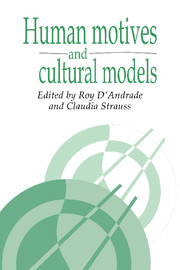2 - Schemas and motivation
Published online by Cambridge University Press: 05 June 2012
Summary
In current anthropological theory there is no clear relation between culture and action. Of course, one can say “people do what they do because their culture makes them do it.” The problem with this formulation is that it does not explain anything. Do people always do what their culture tells them to? If they do, why do they? If they don't, why don't they? And how does culture make them do it? Unless there is some specification of how culture “makes” people do what they do, no explanation has been given.
This explanatory gap is especially apparent when one tries to understand why people in a particular culture put much effort into doing some things rather than other things. The standard account of such phenomena is that such strivings are the result oi motivation; what remains unclear is how culture is connected to motivational strivings. Without an account of the relation between culture and motivation we may have an intuitive sense that there are culturally based strivings, but we have no explanation of this.
The theoretical need to include motivational analysis in the study of culture and society is generally recognized. The point that motivation is necessary for the performance of cultural roles, for example, has been made with force and clarity a number of times (Fromm 1944, Spiro 1987a, Whiting 1941). But in spite of the cogency of this argument, most ethnographies do not contain accounts of the motivational life of the people being studied.
- Type
- Chapter
- Information
- Human Motives and Cultural Models , pp. 23 - 44Publisher: Cambridge University PressPrint publication year: 1992
- 189
- Cited by



